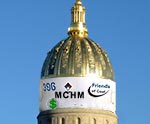- Share on Facebook
- Like
- Digg
- Tumblr
- VKontakte
- Buffer
- Love This
- Odnoklassniki
- Meneame
- Blogger
- Amazon
- Yahoo Mail
- Gmail
- AOL
- Newsvine
- HackerNews
- Evernote
- MySpace
- Mail.ru
- Viadeo
- Line
- Comments
- SMS
- Viber
- Telegram
- Subscribe
- Skype
- Facebook Messenger
- Kakao
- LiveJournal
- Yammer
- Edgar
- Fintel
- Mix
- Instapaper
- Copy Link
- Bluesky
The Senate Judiciary Committee passed as amended SB27 on Saturday to allow McDowell County voters to decide if they want 50,000 tons of out-of-state trash rolling in monthly by rail and disposed of in county.
To attempt to avoid constitutional provisions prohibiting bills from applying only to a single county, and with the intent of this bill to apply to only a single county, Sen. Hall (Wyoming ) agreed to amend the bill introduced through a committee substitute to pertain only to counties with populations less than 40,000 people.
Despite the amendment as Sen. Miller (Greenbrier) pointed out, there are many counties other than McDowell in the state with populations less than 40,000 people that would be affected by the bill. When first speaking on this bill before the Senate Judiciary Committee earlier this week, Sen. Miller compared the bill to another bill on the agenda allowing for unlimited campaign donations in West Virginia. Sen. Miller said, “first we have unlimited campaign money and now we are going to have unlimited trash.”
Senate Bill 27 will increase the county solid waste fee to give the county an extra 25 cents per ton of trash disposed of in the county. The bill will also exempt from other fees levied statewide all solid waste that is transported by rail to a solid waste disposal facility located in a county bordering another state with a population less than 40,000 people.
This would exempt Norfolk Southern Corp (NSC) when shipping by rail from paying $6.25 a ton in statewide solid waste fees while only giving 25 cents of that exempt fee back to McDowell County. A standard 100-car train filled with compacted solid waste has a capacity of 4,000 tons. This translates a maximum of 12 trains per month due to the monthly tonnage cap. According to sources familiar with the deal, the contract NSC is seeking sewage sludge is what would be transported. Currently NSC competitor CSX hauls sewage sludge from New Jersey to Envio Solutions Incorporated’s Big Run Landfill in Ashland, KY.
Sen. Herb Snyder (Jefferson) offered an amendment to divert this $6.25 fee to a fund dedicated to sewer and water infrastructure projects in McDowell County; but the amendment was rejected by the committee. The amendment would have removed the exemption for trash transported from out-of-state by rail, avoiding manipulation of the market by the legislature to benefit a single company.
In speaking to the amendment Sen. Romano (Harrison) referred to the deal to bring unlimited trash into the state and passage of a bill that will benefit only one county and one company as a deal that “stinks,” pun intended.
Like most bills this session purporting to create jobs, no evidence was provided to substantiate the claim from Sen. Hall that this bill would give McDowell County more money or create any jobs. There is a tonnage cap on the Copper Ridge Landfill in McDowell County at 50,000 tons per a month. This would be a maximum of $150,000 a year in increased revenue to the county with the passage of the bill.
According to Envio Solutions Incorporated (ESI) who owns the Copper Ridge facility, in 2013 they were disposing of 510 Tons of solid waste per a day. If this rate is used to calculate a proposal similar to that of Sen. Snyder’s amendment keeping solid waste fees the same and diverting them directly to the county, there would be $1.2 Million sent to the county annually without an increase in solid waste transported to the facility by rail. The maximum amount sent to the county under SB27 as proposed by Sen. Hall would be $450,000. Due to these factors it appears that the Senate Judiciary rejected an amendment that actually would have given McDowell County more money. It’s clear the reason for the bill had nothing to do with giving McDowell county more money and was all about giving a break to Norfolk Southern, a $33 billion corporation.
Fortunately SB27 was referred to the Senate Finance Committee and will not appear on first reading Monday, which is the deadline for bills to be voted out of committee and meet the deadline to cross over and be taken up by the House.






